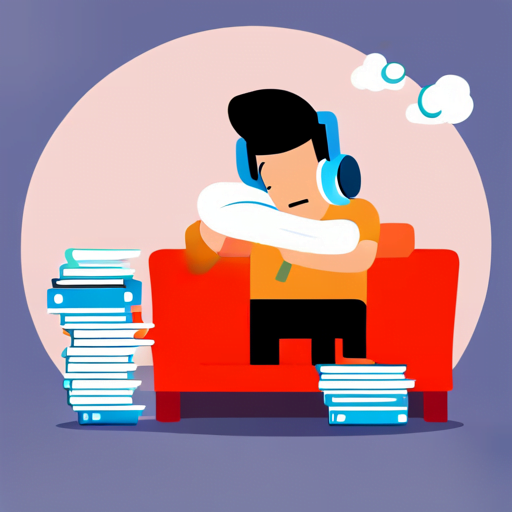Are you tired of lugging around heavy books or squinting at small print? Have you considered switching to audiobooks? With the increasing popularity of audiobooks, it’s worth exploring whether they are the future of reading.
Audiobooks have come a long way since the days of cassette tapes and bulky CD sets. Now, they are easily accessible through digital platforms like Audible and can be listened to on a variety of devices. But is this convenience enough to make them the preferred method of reading?
Let’s take a closer look at the pros and cons of audiobooks and their impact on literature and publishing.
Table of Contents
The Rise of Audiobooks

You might be surprised to know that more and more people are opting to listen to their favorite books rather than flip through physical pages. The rise of audiobooks can be attributed to several factors.
One of the main reasons is the convenience they offer. With audiobooks, you can listen to your favorite books while doing other things like exercising, commuting, or cooking. This makes it easier to fit reading into your busy schedule.
Another factor contributing to the rise of audiobooks is the growing number of people with visual impairments or reading difficulties. Audiobooks offer an accessible alternative to traditional reading, allowing people with disabilities to enjoy books just like anyone else.
Additionally, audiobooks are more engaging than traditional reading, as they allow listeners to hear the nuances of a story in a way that simply reading words on a page can’t replicate. As a result, more and more people are turning to audiobooks as their preferred way of consuming literature.
The Pros of Audiobooks

If you’re looking for a convenient way to consume books without compromising your schedule, then opting for the audio versions might just be the perfect solution for you.
One of the biggest advantages of audiobooks is that you can listen to them anytime, anywhere. Whether you’re driving to work, cooking dinner, or doing your daily workout, you can still enjoy a good book without having to hold a physical copy in your hands. This flexibility allows you to multitask and make the most of your time, without sacrificing the pleasure of reading.
Another pro of audiobooks is that they can enhance your comprehension and understanding of the material. Listening to a book being read out loud can help you pick up on subtle nuances, intonations, and inflections that you might miss when reading silently. This can make the experience more immersive and engaging, and can also help you retain the information better.
Additionally, audiobooks often come with added features such as sound effects, music, and even different voice actors for different characters, making the story come to life in a unique and memorable way.
The Cons of Audiobooks

While it may be tempting to rely solely on listening to books, it’s important to note that you may miss out on the visual aspect of reading, such as seeing the author’s writing style and formatting choices.
Audiobooks may also be less engaging for some readers, as they lack the physical interaction of turning pages and the sense of progress that comes with seeing how much of the book you’ve read.
Another downside to audiobooks is that they can be less convenient in certain situations, such as when you’re in a noisy environment or when you need to quickly reference a specific passage.
Additionally, some people simply prefer the act of reading and find that audiobooks can’t fully replace the experience of holding a physical book and immersing themselves in the story.
While audiobooks can certainly be a convenient and enjoyable way to consume literature, it’s important to consider the potential drawbacks before making them your primary method of reading.
Comparison to Physical Books

Imagine holding a physical book in your hands, turning the pages and being visually immersed in the author’s writing style and formatting choices. It’s a sensory experience that cannot be replicated through any other medium. There is something special about the way you can interact with a physical book. You can flip back and forth between pages, underline and make notes in the margins, and feel the weight of the book in your hands.
It’s a tactile experience that cannot be replaced by the convenience of audiobooks. While audiobooks are convenient for those who are always on the go, they can’t compare to the experience of reading a physical book. With a physical book, you have control over the pace of your reading and can engage with the text in a way that audiobooks simply cannot replicate.
The physical act of reading a book can also help with comprehension and retention of the material. While audiobooks may be a great alternative for those who have difficulty with reading or who have busy schedules, they cannot replace the unique experience of reading a physical book.
Audiobook Trends

The evolving trends in narrators, production quality, and availability of digital platforms are transforming the landscape of literary consumption. Today, audiobooks are becoming more accessible and convenient, thanks to subscription services like Audible and Scribd. These platforms offer a wide range of titles, from bestsellers to indie books, at a lower cost than physical copies.
Moreover, the quality of audiobooks has improved significantly. More publishers are investing in professional narrators and sound engineers. Many authors are also recording their own books, adding a personal touch to the listening experience. As a result, listeners are more engaged and immersed in the story. This makes audiobooks a compelling alternative to traditional reading.
With these trends in mind, it’s no surprise that audiobooks are poised to become the future of reading.
Impact on Literature and Publishing

You can imagine the world of literature and publishing being completely transformed by the growing popularity and accessibility of audio storytelling. More and more authors, publishers, and readers are embracing this dynamic medium as a powerful way to convey stories and ideas.
Audiobooks have opened up a whole new world of possibilities for both writers and readers. With the rise of audiobooks, authors have the opportunity to reach a wider audience, and readers can experience stories in a new way.
Audiobooks have also given a boost to the publishing industry. With the increasing demand for audiobooks, publishers are now investing more in audio production and marketing. Audiobooks have become a significant source of revenue for publishers, and many are now releasing audiobooks simultaneously with print and e-book editions.
The impact of audiobooks on literature and publishing is undeniable, and it’s clear that this trend is here to stay.
The Future of Reading

So, what’s in store for the future of reading? Well, it’s safe to say that audiobooks will continue to grow in popularity and may even become the preferred method for some readers.
However, the importance of personal preference cannot be ignored, as physical books still hold a special place in the hearts of many. Ultimately, it’s likely that audiobooks and physical books will coexist, catering to the different needs and preferences of readers.
Prediction for Audiobooks
We’re on the cusp of a new era where people will consume stories in ways they never have before. Audiobooks are a clear indication of this shift. With busy schedules and the need for multitasking, people are looking for ways to enjoy stories without having to dedicate all their time to reading.
Audiobooks offer the perfect solution by allowing you to listen to a book while doing other things like driving, cooking, or exercising. The prediction for audiobooks is only going up from here. As technology advances, audiobooks are becoming more accessible and convenient.
Smart speakers like Amazon’s Alexa and Google Home make it easy to listen to audiobooks without having to even touch a device. With the rise of podcasts, spoken-word content is having a moment, and audiobooks are perfectly positioned to ride this wave.
It’s clear that audiobooks are not just a passing trend but a solid contender for the future of reading.
Importance of Personal Preference
When it comes to finding the perfect way to consume stories, it’s all about your personal preference and what works best for you. Audiobooks might be the future of reading, but that doesn’t mean they’re the best option for everyone.
Some people prefer the traditional method of reading physical books, while others might find e-books more convenient. It all depends on what you enjoy and what fits into your lifestyle.
One of the benefits of audiobooks is that they allow you to multitask. You can listen to your favorite book while driving, exercising, or doing household chores. However, some people might find that they get distracted or have a harder time retaining information when listening instead of reading.
It’s important to experiment with different formats and see what works best for you. Remember, the most important thing is to enjoy the story and immerse yourself in the world created by the author.
Coexistence with Physical Books
For those who cherish the feel and smell of a physical book, audiobooks can coexist as a complement to their reading habits. Audiobooks offer a different reading experience that can enhance your enjoyment of a story.
You can listen to an audiobook while driving, exercising, or doing household chores, making it a convenient option for those with busy schedules. Furthermore, audiobooks can help with comprehension and retention of the story.
Listening to a professional narrator bring the characters to life can help immerse you in the story and understand the plot. Additionally, audiobooks can expose you to a wider range of literature that may not be available in your local bookstore.
So, while physical books will always hold a special place in the hearts of book lovers, audiobooks can coexist as a valuable addition to your reading repertoire.
Frequently Asked Questions
What kind of equipment do I need to listen to audiobooks?
To listen to audiobooks, you’ll need some basic equipment.
First, you’ll need a device that can play the audio file, such as a smartphone, tablet, or computer.
Next, you’ll need some headphones or speakers to actually hear the book. If you prefer to listen on-the-go, you may want to invest in a pair of wireless headphones or earbuds.
Some audiobook services also offer their own dedicated apps, so you may want to download those as well.
Overall, the equipment needed for listening to audiobooks is fairly simple and easy to obtain.
Are all books available in audiobook format?
Not all books are available in audiobook format, but a wide range of titles are now being produced as audiobooks. Popular fiction, non-fiction, and even classic literature can often be found in audio form. However, some niche or obscure titles may not have an audiobook version available.
It’s always worth checking with the publisher or audiobook provider to see if a specific book is available in audio format.
How do audiobooks affect our brain differently than physical books?
When you listen to an audiobook, your brain processes the information differently than when you read a physical book. According to a study published in the journal Brain Connectivity, listening to an audiobook activates the same cognitive and emotional areas of the brain as reading a physical book, but with one key difference.
The study found that when listening to an audiobook, the brain is more focused on the auditory and language processing areas, while reading a physical book engages more of the visual and spatial processing areas of the brain. This means that while audiobooks can be a great way to consume books, they may not offer the same level of engagement and cognitive benefits as physically reading a book.
Can audiobooks be used as an educational tool?
You might be surprised to know that audiobooks can actually be a useful tool in education. They can be used to help struggling readers, as well as students with visual impairments or learning disabilities. Audiobooks also allow for the student to listen to a story or textbook while simultaneously engaging in another activity, such as drawing or walking.
In addition, the use of audiobooks can improve listening skills and comprehension. So, while the debate over whether audiobooks will replace physical books rages on, it’s important to recognize their potential as an educational tool.
How do audiobooks impact the environment compared to physical books?
When it comes to the environmental impact of audiobooks compared to physical books, you might not have considered the difference. However, it’s worth noting that audiobooks have a significantly smaller carbon footprint than physical books.
This is because audiobooks don’t require paper, ink, or transportation costs associated with shipping physical books. Additionally, audiobooks can be downloaded digitally, further reducing the need for physical materials and transportation.
So, if you’re someone who’s concerned about their carbon footprint, audiobooks may be a more environmentally friendly option for you.
Conclusion
So, what does the future hold for reading? Well, it seems that audiobooks are here to stay.
With the rise of digital technology and the convenience of being able to listen on-the-go, audiobooks have become a popular alternative to physical books. They offer a unique experience, allowing you to immerse yourself in a story while going about your daily activities.
While there are certainly pros and cons to audiobooks, it’s clear that they are becoming more and more popular. As technology continues to improve and more people discover the benefits of audiobooks, it’s likely that we will see an even greater shift towards this format in the future.
Whether you’re a busy commuter or just looking for a new way to experience literature, audiobooks are definitely worth considering. So, why not give them a try and see what all the fuss is about? Who knows, you may just find yourself hooked on the world of audiobooks.
